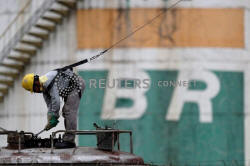Analysis: After Brazil ructions, a rethink for investors in emerging
market state firms
 Send a link to a friend
Send a link to a friend
 [February 26, 2021] By
Karin Strohecker and Simon Jessop [February 26, 2021] By
Karin Strohecker and Simon Jessop
LONDON (Reuters) - Brazil's shake up of
state-run oil firm Petrobras has caused shockwaves at home but may also
prompt some bond investors to rethink their $1 trillion-plus exposure to
other government-controlled companies across emerging markets.
From China's Exim Bank to Mexican oil giant Pemex or South African
utility Eskom, companies wholly or partly government owned make up half
of the $2.4 trillion market in emerging market corporate debt.
Such state-owned enterprises (SOEs) are generally in high demand from
investors, first as their bonds carry a yield premium over sovereign's
debt and second, because of the perception of state backing.
But Brazilian President Jair Bolsonaro's abrupt sacking of Petroleo
Brasileiro SA's chief executive last Friday in favour of an army general
"reminds investors of the risk inherent of investing in SOEs or
quasi-sovereigns," said Eric Ollom, head of EM corporate debt strategy
at Citi.

Petrobras shares plunged wiping out a 100 billion reais ($18 billion) in
market value in two days and its bonds tumbled after Bolsonaro announced
the CEO change in a social media post, following a spat over fuel price
policy.
Emerging SOE debt - concentrated in financials, commodities and energy
-- comprises around a fifth of the EMBI emerging debt benchmark compiled
by JPMorgan. Governance, like at Petrobras, is just one of the concerns.
Graphic: IMF top non-financial SOEs -
https://fingfx.thomsonreuters.com/
gfx/mkt/gjnpwzrryvw/IMF%20top%20non-financial%20SOEs.PNG
Utilities and power companies can be subject to politically motivated
pricing directives, while financial disclosures and productivity can lag
the private sector.
Profitability can take a backseat to political priorities such as
creating employment or winning elections.
"First and foremost, investors need to figure out and understand where
does this SOE fit into the agenda of the political and socio-and
economic landscape of the country... its social importance as employer
or as a contributor to the budget," Sergey Dergachev, a fund manager at
Union Investment, said.
He still likes Petrobras but is taking a wait and see attitude for now
on a company that regularly catches the limelight. In 2018 the
government stepped in to lower fuel prices in response to a crippling
nationwide truckersí strike, while last week's CEO dismissal came after
right-wing populist Bolsonaro said recent fuel price hikes were hurting
the Brazilian people.
Other investors such as Citi's Ollom are more sceptical, noting
Petrobras bond spreads versus the sovereign blew out to multi-month
highs of near 100 bps, from 30 bps. The move also hit Brazil's currency
and its sovereign bonds.
"If we keep getting bad news, we could maybe get a more permanent
repricing," Ollom said.
DECOUPLING?
Investors aren't yet rushing to sell out of emerging market SOEs more
broadly though.
And close government ties can be a boon.
[to top of second column] |

A worker checks the fuel volumes on a train wagon near a tank of
Brazil's state-run Petrobras oil company in Brasilia, Brazil,
February 19, 2021. REUTERS/Ueslei Marcelino/File Photo

Mexico just extended a $3.5 billion lifeline to state oil firm Pemex to shore up
finances and crude output. Government backing allows Pemex to run a net debt
leverage of 8.5 times - well above many other oil firms.
Debt overhauls are rare at SOEs, though recently Chinese bond markets have been
spooked by a wave of SOE defaults and Argentina's YPF this year was forced to
overhaul its debt.
"The 'backing' of governments behind debt obligations could represent possible
'coupon buffers' and a signal of stability," said Guillaume Mascotto, head of
ESG and investment stewardship at American Century Investments.
Nonetheless, the risk of state interference poses a dilemma for investors,
especially for asset managers focusing on the environmental, social and
governance (ESG) impact of their holdings, Mascotto said.
Corruption poses another headache. State-owned companies in nations with "high
levels of perceived corruption" are one third as productive as their private
sector peers, according to a recent report by the International Monetary Fund.
Emerging market assets were roiled by the fallout from the pandemic last year,
which sparked billions of dollars in outflows. Bonds from fully state-owned
companies moved broadly in lockstep with sovereign debt.
Around 90% of SOEs hold credit rating scores in line with their sovereign. Most
divergences where the SOE is rated below the sovereign are investment-grade
firms, where default probability differentials are negligible, calculates asset
manager GMO.
The Petrobras shock may however test that close link.
If investors start questioning the ability and or willingness of the sole
shareholder -- the government -- to support a company, yield spreads between the
sovereign and the SOE could decouple.
"Increasing leverage on sovereign balance sheets might amplify this
development," Thede Ruest, portfolio manager at Nordea, said.
The feedback loop can work both ways. Morgan Stanley on Monday struck Brazil's
sovereign bonds off its 'like' list, citing fiscal concerns and potential
spillovers after Bolsonaro's push.
Investors' growing ESG focus is another source of pressure, said Ruest, who
avoids quasi-sovereigns.

"Higher funding costs, as well as a global push to redirect capital towards
business models supporting the U.N.'s SDGs (Sustainable Development Goals),
might make refinancing more difficult for many of those issuers," he said.
($1 = 5.5308 reais)
(Reporting by Karin Strohecker and Simon Jessop; Editing by Sujata Rao and Susan
Fenton)
[© 2021 Thomson Reuters. All rights
reserved.] Copyright 2021 Reuters. All rights reserved. This material may not be published,
broadcast, rewritten or redistributed.
Thompson Reuters is solely responsible for this content. |